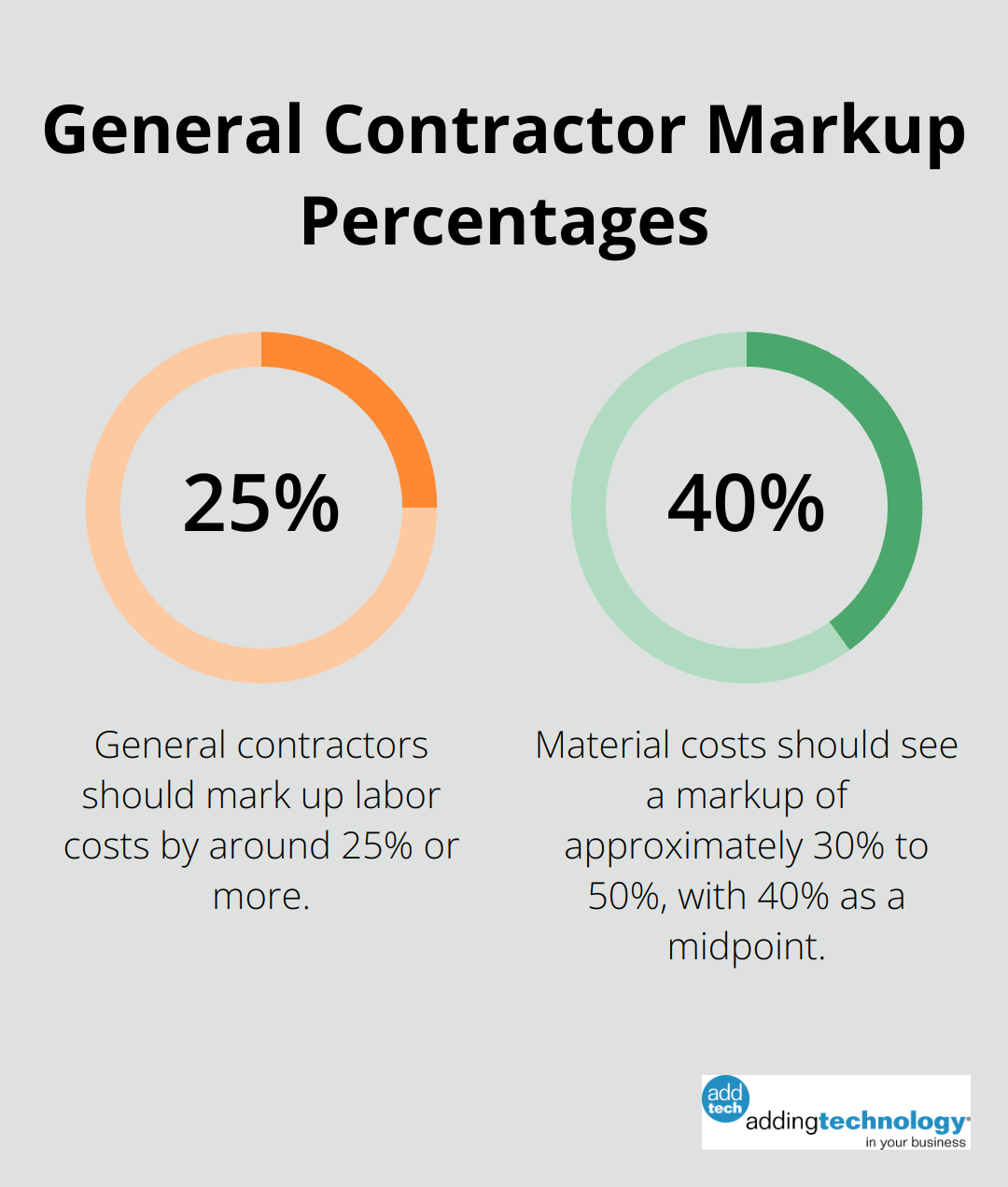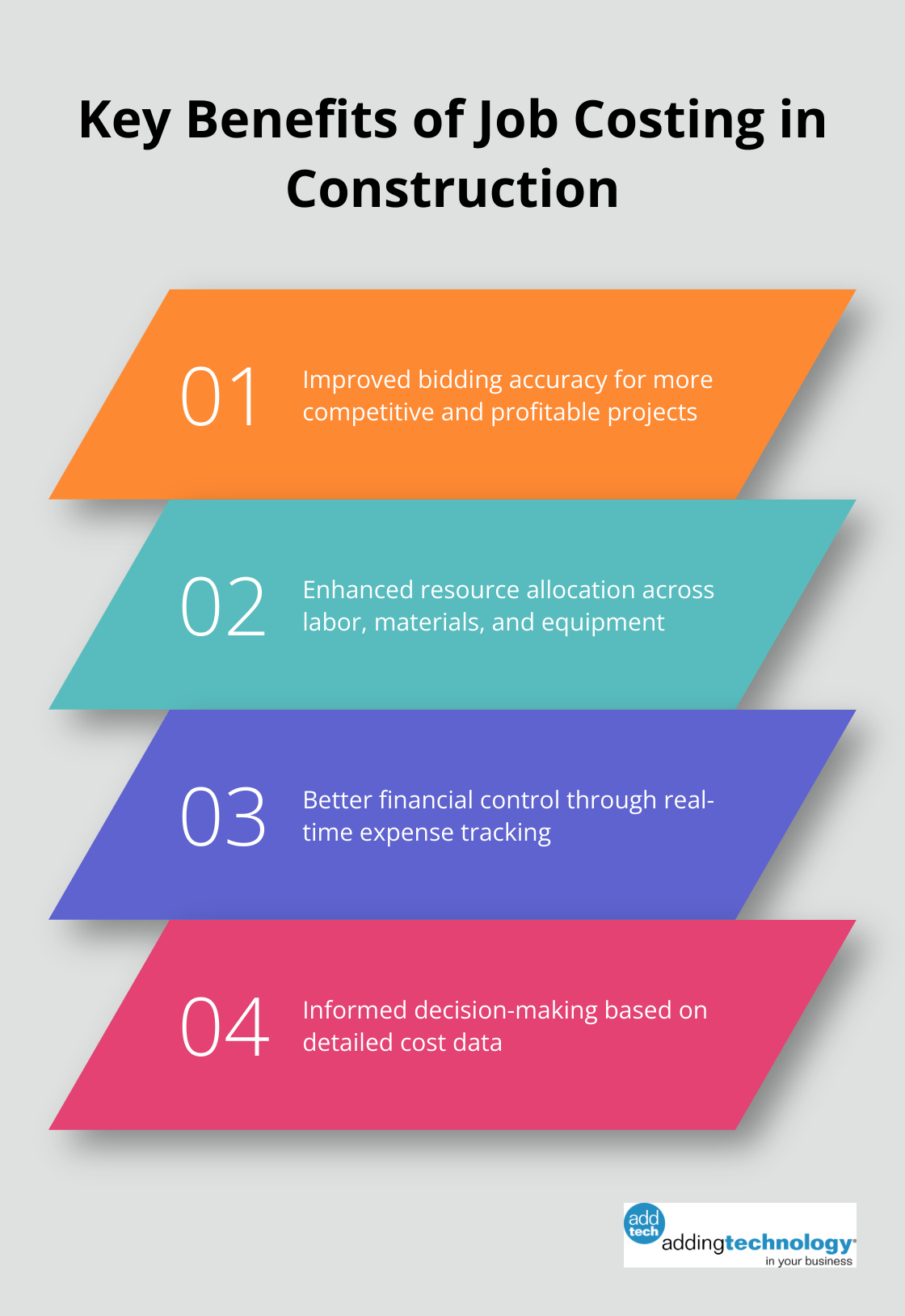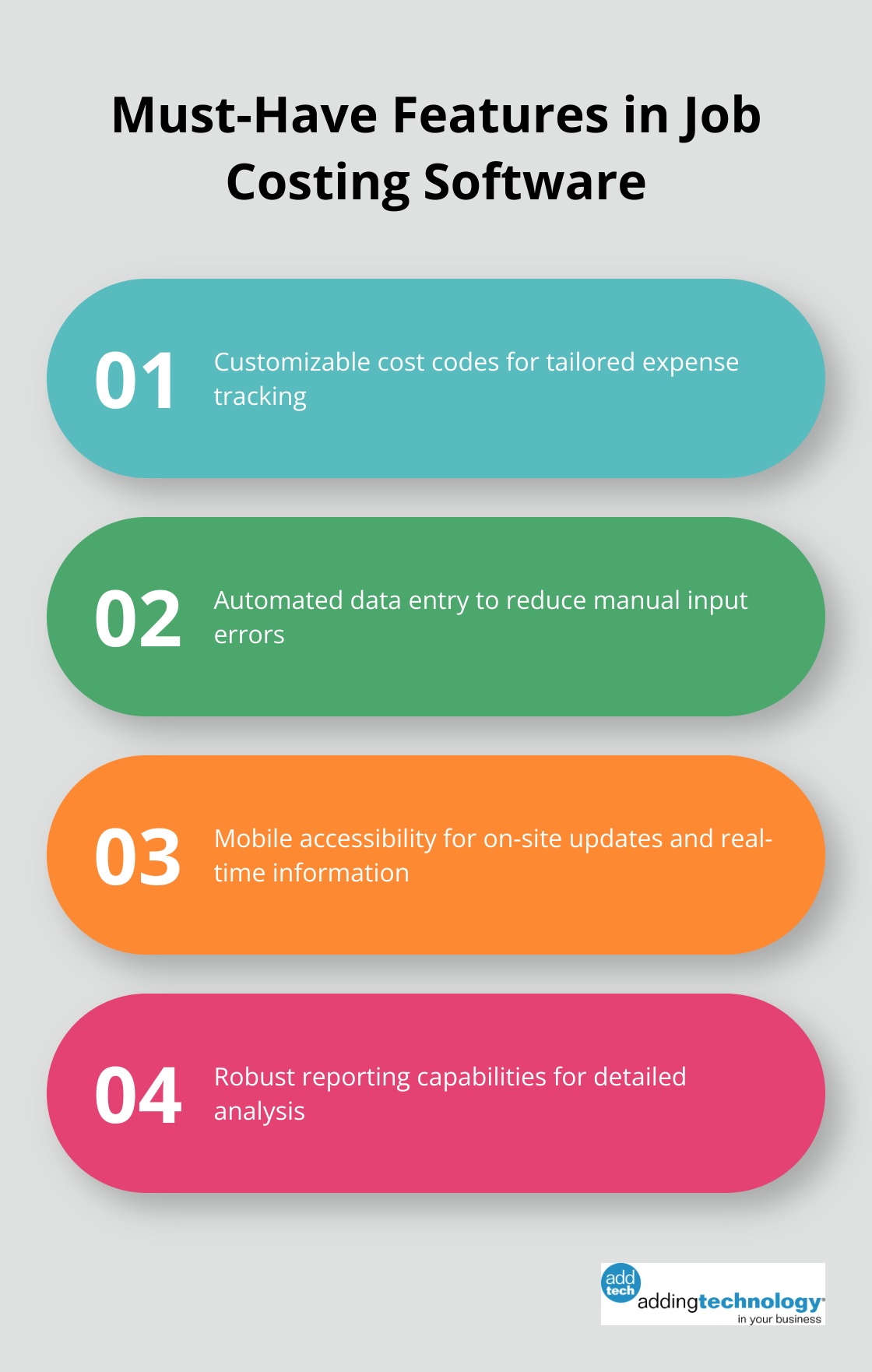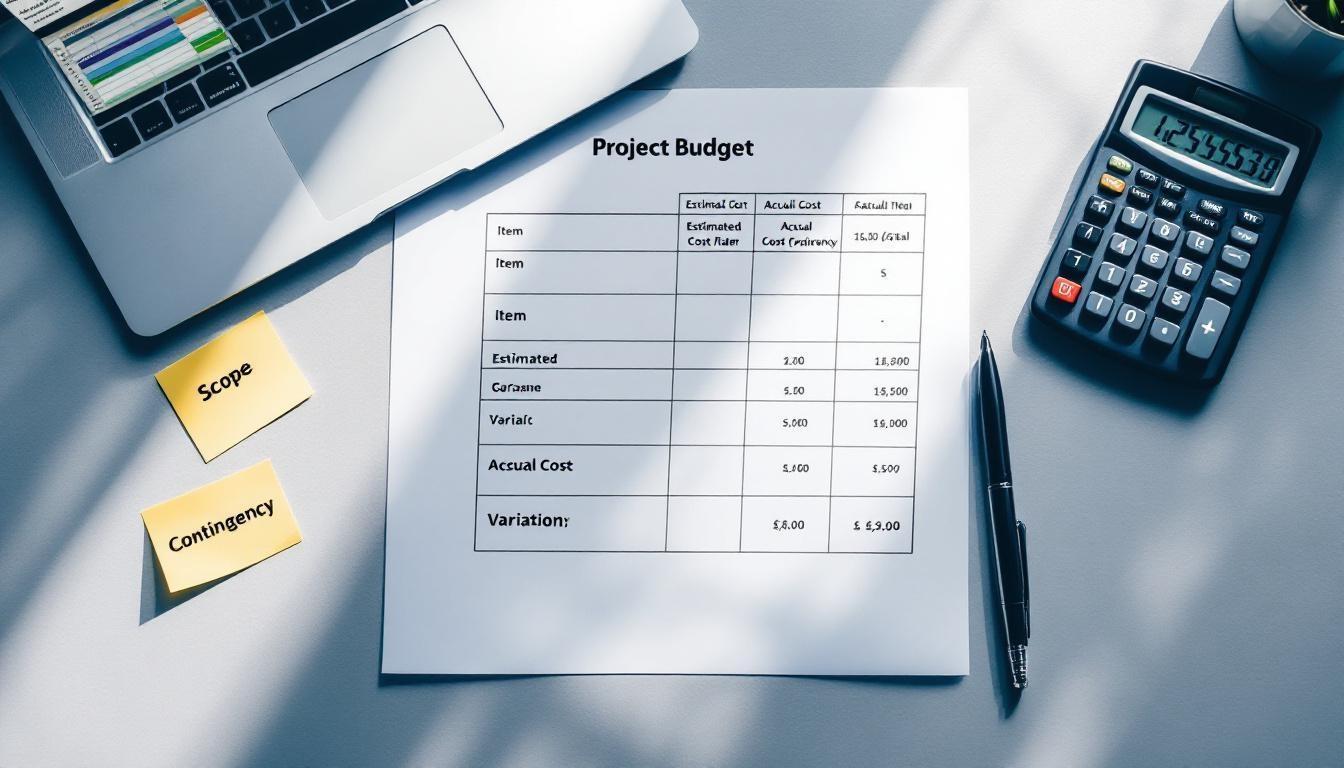
At adding technology, we understand the critical role job costing plays in construction projects. The importance of job costing cannot be overstated when it comes to managing costs, improving profitability, and making informed decisions.
In this post, we’ll explore why job costing is essential for construction businesses and how it can transform project management. We’ll also provide practical tips to help you implement effective job costing practices in your organization.
Job costing is a financial management method that tracks expenses for individual construction projects. This approach transforms project management and financial control for construction companies.
Job costing assigns costs to specific jobs or projects rather than to the business as a whole. This method allows construction companies to track labor, materials, and overhead expenses for each project separately. As a result, businesses can accurately determine the profitability of individual projects and make informed decisions about future bids and resource allocation.
Successful job costing relies on three main components:
Cash flow forecasting in construction management can help you make more informed decisions and better plan your company’s project workloads and workflows. Construction firms that implement detailed job costing often outperform their competitors in financial management and project delivery.
Unlike traditional accounting methods that focus on overall business performance, job costing provides a granular view of each project’s financial health. This level of detail is essential in the construction industry, where project scopes and timelines can vary significantly.
Process costing, another common accounting method, is more suited for industries with standardized production processes. Construction projects, however, are unique and require the specificity that job costing offers.
Job costing offers several advantages to construction companies:
To implement job costing effectively, construction companies should:
As we move forward, we’ll explore the specific benefits of effective job costing and how it can transform your construction business’s financial management and project success.
Job costing empowers construction companies to create highly accurate project estimates. Analysis of historical data from similar projects allows prediction of costs with remarkable precision. This accuracy results in more competitive bids without sacrificing profitability. A general contractor should mark up labour costs by around 25% and more, and material costs should see a markup of approximately 30% to 50%.

Real-time expense tracking is essential for maintaining financial control. Job costing allows immediate detection of cost overruns, rather than discoveries at the project’s end. This early detection enables swift corrective action, which preserves profit margins. Industry surveys indicate that construction firms using advanced job costing techniques experience an average increase in profitability of 8-12%.

Job costing provides a wealth of data that informs critical business decisions. Companies can identify the most profitable types of projects, subcontractors that deliver the best value, and inefficiencies in their processes. This information proves invaluable for strategic planning and resource allocation. Data analytics are transforming construction through better project planning and more accurate cost estimates.
Detailed job costing improves project management through clear insights into project progress and resource consumption. Project managers make informed decisions about scheduling, resource allocation, and change orders. This level of control leads to fewer delays and budget overruns. Construction projects managed with robust job costing systems (such as those offered by Adding Technology) are 30% more likely to complete on time and within budget.
Implementation of effective job costing requires more than just new software; it demands a new approach to financial management in construction. The right job costing practices transform not just the building of structures, but the creation of a more successful, profitable business. This shift in approach sets the stage for our next discussion: the practical steps to implement job costing in your construction projects.
The foundation of effective job costing lies in choosing the right software. Look for solutions that offer real-time data processing, integration with existing systems, and user-friendly interfaces. KPMG’s 14th Global Construction Survey, the biggest to date, contains insights from nearly 300 E&C firms from around the globe.

When evaluating options, prioritize software that provides:
Adding Technology’s job costing solution offers all these features plus seamless integration with popular accounting platforms.
A well-designed cost structure is essential for accurate job costing. Create a standardized system of cost codes that align with your company’s specific needs and industry standards. The Construction Specifications Institute’s MasterFormat provides a solid foundation, but tailor it to your operations.
Divide your costs into clear categories such as:
The success of your job costing system depends on your team’s ability to use it effectively. Invest in comprehensive training programs that cover both the technical aspects of the software and the principles of job costing.
Create a culture of accountability where every team member understands their role in maintaining accurate cost data. Regular refresher courses and clear documentation of procedures help ensure consistent application across all projects.
Job costing should not exist in isolation. Integrate it with other business processes like project management, payroll, and inventory control. This holistic approach provides a more comprehensive view of your business operations.
For example, link job costing with your scheduling software to allow real-time updates on labor costs as project timelines shift. Connect with inventory systems to ensure material costs accurately reflect in job reports.
Implement effective job costing as an ongoing process. Review and refine your processes regularly. Use the insights gained to improve your financial management practices continuously. With the right approach and tools (such as those offered by Adding Technology), job costing can become a powerful driver of profitability and success in your construction or contracting business.
CFMA’s one-day workshop on construction accounting principles can help you identify key principles and explain core points of revenue recognition, which are essential for effective job costing.
Job costing stands as a cornerstone of successful construction project management. Its importance cannot be overstated in an industry where precision, efficiency, and profitability are paramount. Job costing provides a granular view of project expenses, empowers construction businesses to make informed decisions, improves bidding accuracy, and optimizes resource allocation.
The long-term benefits of implementing robust job costing practices are substantial. Construction companies that embrace this approach often experience increased profitability, enhanced project delivery, and improved client satisfaction. These advantages compound over time, lead to sustainable growth, and create a competitive edge in the market.
The importance of job costing cannot be ignored for construction businesses looking to thrive in today’s challenging environment. Adding Technology offers specialized accounting and financial management services tailored for construction businesses, including advanced job costing solutions. Their expertise can help you build a solid financial foundation, streamline your processes, and unlock the full potential of your construction business.








At adding technology, we know you want to focus on what you do best as a contractor. In order to do that, you need a proactive back office crew who has financial expertise in your industry.
The problem is that managing and understanding key financial compliance details for your business is a distraction when you want to spend your time focused on building your business (and our collective future).
We understand that there is an art to what contractors do, and financial worries can disrupt the creative process and quality of work. We know that many contractors struggle with messy books, lack of realtime financial visibility, and the stress of compliance issues. These challenges can lead to frustration, overwhelm, and fear that distracts from their core business.
That's where we come in. We're not just accountants; we're part of your crew. We renovate your books, implement cutting-edge technology, and provide you with the real-time job costing and financial insights you need to make informed decisions. Our services are designed to give you peace of mind, allowing you to focus on what you do best - creating and building.
Here’s how we do it:
Schedule a conversation today, and in the meantime, download the Contractor’s Blueprint for Financial Success: A Step by-Step Guide to Maximizing Profits in Construction.” So you can stop worrying about accounting, technology, and compliance details and be free to hammer out success in the field.